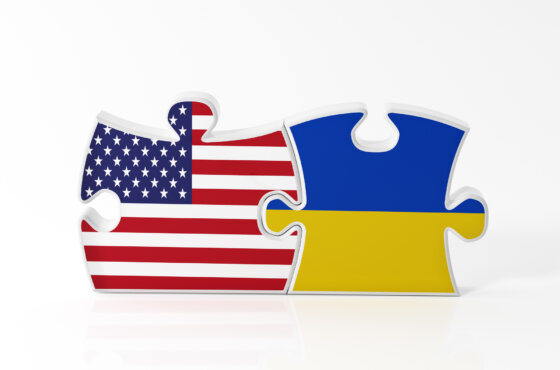The Washington Post: Russia is no longer a superpower
Opinions of experts regarding the motivation of the Kremlin in the Ukrainian conflict are divided. Is Russia a greedy country that by its ideology seeks to expand its territory, or is it a dangerous, weakening superpower, defending itself against NATO?
Along with numerous inconsistencies in the arguments of realists, as Alexander Motyl wrote about in his last publication, the polemical statements do not mention the time of the Russian aggression in Ukraine. Since the expansion of the alliance to the Baltic countries in 2004, the land border of Russia with NATO countries was more than twice as long as its land border with Georgia, and yet, for some reason, Russia waited and reacted only in 2008. Similarly, in his response to Mirscheimer, former US Ambassador to Russia Michael McFaul notes that during numerous meetings between President Obama, President Vladimir Putin and Prime Minister Dmitry Medvedev, the issue of NATO expansion has never been raised in five years. Moreover, for most of Putin’s presidency, Russia participated in numerous joint projects with NATO (including joint military exercises and peacekeeping operations) and, apparently, completely ignored the threats to its existence from the alliance.
A more serious mistake in reasoning, according to which "Russia", "Kremlin" or "Putin" are considered as something monolithic and unchanging in time, is that neither Russia, nor Putin for the 15 years he has been in power, are unchanged or not at all. First of all, if Russia were a single whole, the Soviet Union would never have collapsed. But the observed inconsistency in the behavior of the Kremlin, which realistic theories try to explain in every way, can be easily understood if we remember that Russia is not so much a “dangerous superpower” than an oil state. Experience has shown that oil states become aggressive towards their neighbors when oil prices soar. Using the 153 countries as an example over a 50 summer period, political analyst Cullen Hendrix (Cullen Hendrix) showed that due to high prices, oil-exporting countries become much more aggressive towards their closest neighbors, while these prices do not affect the behavior of countries that do not oil exporters. On average, if the price of oil exceeds the threshold 77 dollars per barrel with the dollar's purchasing power at the level of 2008 of the year, then oil states become 30% more aggressive than countries that do not export oil.
Jeff Colgan of Brownian University analyzed interstate conflicts with military force in 170 countries from 1945 to 2001 and found out that countries where net income from oil exports is more than 10% of GDP is the most belligerent in the world . Such oil countries on average showed a significant propensity for interstate disputes with the use of military force and in the period after World War II entered into armed conflicts on 50% more often than countries that are not oil exporters. Examples include cases when Bolivian President Evo Morales and Venezuelan President Hugo Chávez expelled US ambassadors from their countries, Venezuela mobilized for the war with Colombia, and Iran during the rise in oil prices to peak values in 2008 supported the Hamas movement during the attacks on Israel. Similarly, Iraq invaded Iran in the 1980 year, and Libya repeatedly attacked Chad — also during a sharp rise in oil prices in the 1970 and 1980 years. The mechanism is very simple: high oil revenues contribute to a decrease in the personal political responsibility of the authorities inside the country and their responsibility for making political decisions, which leads to an increase in adventurism in the international arena. Oil revenues also help build up the military potential of countries, providing them with more substantial and more interchangeable pools to finance military spending.
From this point of view, Russia is not so much a dangerous superpower as a typical oil state that does not build long-term plans, which becomes aggressive and ambitious as soon as it accumulates substantial revenues from the sale of oil. Back in the early 2000s, when the price of oil was 25 dollars per barrel, Putin was a friend of the United States and did not object to the expansion of NATO in 2004. According to a Hendrix study, it is in this way that oil states behave when oil prices are low. Indeed, when oil prices are lower than 33 dollars per barrel, oil exporters become even more peaceful than countries that do not export oil. Back in the 2002 year, when the price of Urals oil was approximately 20 dollars, Putin, in his message to the Federal Assembly, identified numerous steps to ensure European integration and active cooperation in order to create a single economic space with the European Union as a priority for Russia. And in the 2014 year — when the price of oil reached 110 dollars — Putin invaded Ukraine in order to punish her for striving to create the same common economic space with the EU.
In the 2007 year, shortly after oil prices jumped for the first time to a maximum of 75 dollars per barrel (which is close to 77 dollars per barrel, with the dollar's purchasing power at the level of 2008 of the year Hendrix spoke of), Putin delivered his famous Munich speech . In it, he for the first time challenged the hegemony of the United States, but was still full of hope regarding the prospects for a constructive partnership with the United States and Europe. By the year of 2014 — when the price of oil rose to 100 dollars — Putin, in his Valdai speech, completely rejected the possibility of any constructive cooperation with the United States.
When the Soviet Union entered Afghanistan in 1979, the price of oil was at its maximum for that time at 101 dollars per barrel. And the recent adventures of Russia in Georgia in the 2008 year and in the Ukraine in the 2014 year were undertaken when oil prices broke the highs of 1980 of the year (105 dollars) and 2008 of the year, respectively, everything happened exactly in accordance with the theory of the aggressive behavior of oil states. From this point of view, the position of NATO regarding the annexation of the territories of Georgia and Ukraine has in fact in no way affected the aggressive policy of Russia in these two countries - unless it served as a convenient excuse for fomenting its ambitions.
And if, to outside observers, Russia may seem to be "a great power with an aging, shrinking population and a weakening economy," then the Kremlin elites, who have accumulated huge reserves, obviously do not think so. On the contrary, they rank Russia among the three world superpowers along with the USA and China, they constantly call Russia the energy superpower, the second country in the world to supply arms and so on. On the Russian state channels, they regularly make it clear that, if necessary, the Russian army can reach Eastern Europe, Berlin or London in a few days.
It is well known the statement of Robert Jervis (Robert Jervis) that personal representations of key persons of the state and how they distort reality, are much more important than is commonly thought. And, perhaps, such a distortion of reality is even more important if we are talking about the leaders of the oil states - regardless of what NATO wants or thinks.











